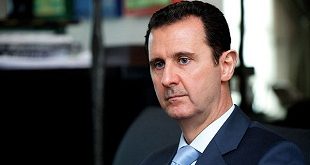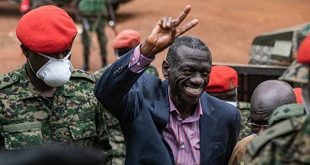
By Haggai Matsiko
When Museveni wears Beijing’s big boots
On Feb. 21, the China National Offshore Oil Company (CNOOC), acquired a third of Uganda’s newly discovered but potentially huge oil reserves in a US$ 2.9 million farm-down deal with the British firm, Tullow Oil and France’s Total. Nothing official yet, but China is expected to lead negotiations to construct an oil refinery in the country’s Albertine region.
This deal was the latest in Beijing’s courtship of Kampala with its wads of cash, loans, grants, and investments. Speaking at a reception soon after the CNOOC deal on Feb. 23, the new Chinese ambassador to Kampala, Zhao Yali, stated Beijing’s intentions:
“In conducting cooperation with Africa,” he said, “we adhere to the principles of mutual benefit and common development, making sure that our assistance will be result-oriented, without strings attached. This practice has been widely appreciated by African countries.”

He reminded his guests that his country had invested US$596 million in Uganda in the last decade. Like it has done in several countries in Africa; from Angola to Zimbabwe, and Cameroon, China is marking its entry into Uganda by donating a swanky new US$27 million twin-tower office for President Yoweri Museveni, a new hospital, the Uganda-China Friendship Hospital in the capital, and a US$350m Kampala express highway—the biggest road project in years, from the country’s only international airport to the capital. There are many other smaller projects and when Chinese Defence Minister, Liang Guanglie, visited Kampala late last year, he handed Museveni a US$2.3 million military assistance cheque.
Zhao also mentioned China’s other donations to Uganda, including the country’s biggest football stadium at Nambole in Kampala, the Foreign Affairs ministry office building, the National Statistics Office building, and others. Zhao said China’s interests in Uganda like in the whole of Africa is simply business.
China’s focusing on business is, however, a very unpopular pitch on the street in Kampala. The Sino-Uganda business relationship is terribly unequal. Although the value of bilateral trade between the two had reached a record US$ 400 million high, China’s exports are bulging at US$359 million compared to Uganda’s to US$ 40 million. Some analysts like Dr. Paul Omach, an international relations expert at Makerere University, say China’s interest in Uganda is not business but oil. They worry that for oil, “China is willing to pay whatever the price”.
“It is likely to worsen corruption considering that they do not believe in transparency,” Dr Omach told The Independent in an interview.
Two weeks before Ambassador Zhao hosted his party, President Museveni gave Ugandans a taste of what his dealings with China portend when he signed agreements with Tullow that enabled the CNOOC farm-down deal in total disregard for a Parliamentary moratorium. In an attempt to explain why he did it, Museveni told parliamentarians that a Chinese minister had convinced him that with new cleaner sources of energy emerging by the day, oil might soon not be as precious.
Uganda’s oil reserves are unproven but highest estimates place them at about 2 million barrels. It is, however, unclear if the Chinese official told Museveni that China in fact is among the top 15 countries with the biggest proven oil reserves in the world. Despite sitting on 20 billion barrels of oil, China is seeking to acquire more in Angola, Equatorial Guinea, Nigeria, and the two Sudans, and Uganda.
Museveni’s game
While China wants oil, Dr. George Okiror, another senior lecturer at the Department of Political Sciences, Makerere University, says President Museveni also needs the Chinese.
“They are a luring, rich alternative to the West that has increasingly attacked Museveni for his undemocratic tendencies,” Dr Okiror says.
The West, mainly the U.S., EU, and their partner organizations like the World Bank and IMF, have until now been the main funders of the Ugandan economy. Observers say China’s donations, especially of US$2.3 million to fund the Uganda army’s mission in Somalia, was meant to stamp Beijing’s imprint in the region.
Okiror’s colleague at Makerere University, Prof. William Muhumuza, who has written a paper on China, says Beijing’s interest in Africa has in this way renewed an ongoing “scramble for Africa’s natural resources”. He predicts that China is likely to emerge victorious because, he says, it is smarter and clear from the start that they do not care about democracy and are only interested in getting natural resources as fast as possible. He says by claiming to uphold democratic values, the U.S and their partners are being ironical, quietly they do not push for democracy in Uganda.
“Why is it that a lot of pressure was put on the Moi regime in Kenya, aid was cut and they kept a blind eye on Uganda?” he asks, “as long as their interests are catered for they do not care about other issues.”
Prof. Muhumuza says by playing China off the western interests, Museveni is playing strategically and is likely to get a better deal.
Dr Omach says the West distorted the internal political structures in Uganda and made Museveni so powerful but he has now become too powerful for them.
“The west is to blame for Museveni’s overstay in power,” he says, “but the Chinese are worse because unlike the West, when in pursuit of its national interests, China doesn’t seek to balance this pursuit with other ethical values like human rights, democracy and the like. They believe in totalitarianism, they work for the state, the party and not the individual contrary to western principles where the individual comes fast and then the state.”
They all seem to agree that China is likely to cushion Museveni against the West’s pressures to open up political space and respect human rights. Dr Okiror says that there is an increasing trend among African leaders to see China as an alternative that disregards what the West has been pushing around. He agrees with Omach that the Chinese are likely to enable Museveni hang on longer to power and praises their directness.
“For all these donors, their national interests comes first,” Okiror says, “even for the U.S that claims to champion it, democracy comes second.”
However, although Museveni is their big partner in the fight against terrorism in the East Africa and Horn of Africa region, the U.S, UN, Britain and other western countries have attacked him for his severe crackdown on opposition and the corruption in his government.
Museveni has consistently hit back telling them he needs no lectures on good governance. Unlike in the past when Museveni has often bowed down to the West’s pressure, he is becoming increasingly belligerent. He recently told Parliament that since the discovery of oil he is no longer prepared to countenance the West’s humiliating terms for aid. “They make you write applications like a small boy applying for a job,” he said.
The donors too have noted Museveni’s change of tone since the discovery of oil. They are aware they are no longer as influential with Museveni. In a 2010 Global Witness report, several donors told the researchers that they felt that they no longer wielded that power.
As tension between the two erstwhile friends has grown, the western donors have continued to work with Museveni—albeit uncomfortably, and threatened to cut aid to Uganda.
America reacts
But Daniel Travis, the Public Affairs Officer at U.S. mission in Kampala told The Independent that the U.S. Mission Uganda welcomes China’s increasing engagement with Uganda.
“The United States’ interest in Uganda’s oil industry is limited to its desire to see it benefit the Ugandan people,” he said by email, “Transparent public-private partnership is the best way to make that happen, regardless of where a company involved may have its origins.”
He added that as Secretary of State Hillary Clinton said in June of 2011, the U.S does not see the Chinese commercial and diplomatic interest in Africa as inherently in conflict with U.S. interest.
Travis added that “Collaborative diplomacy” has been a cornerstone of the Obama administration’s foreign policy, especially in Africa. “In practice, this means working closely with our international partners and multilateral institutions on issues of common interest and concern, and, as far as we are concerned, China is an essential part of that policy, he added, “Each donor country has a different approach to aid, and there are merits to each philosophy.”
He said, however, that the important thing, “from our point of view, is the obvious fact that China takes its role as a donor very seriously.”
China’s policy of non-interference is not good for Africa, according to Richard Dowden, author of “Africa: Altered States, Ordinary Miracles”. He writes that the policy of noninterference has freed up China to do business, including selling weapons, to rogue states like Sudan and Zimbabwe.
As a result, China’s list of top trading partners in Africa reads like a script of damned countries. Angola, Sudan, DRC, Equatorial Guinea, Nigeria, Zambia, Zimbabwe. Leaders of these countries with the backing of China have plundered their resources and mistreated their citizens.
This list of China’s partners in Africa worries democracy promoters in Uganda because it reads like a list of the continents worst dictators—José Eduardo dos Santos, Angola’s president and Teodoro Obiang Nguema Mbasogo, Equotorial Guinea’s despot both in power for 33 years. Robert Mugabe, Zimbabwe’s 87 year old despot in power for 29 year was shunned by the west but is China’s darling. Paul Biya’s Cameroon in power for 30 years and Sudan’s Omar al-Bashir who has massacred tens of thousands of his citizens and had over two million displaced mainly with the help of Beijing.
Some observers have predicted that China’s export into Uganda will be typical; increased corruption, resource plunder, regime longevity, and authoritarianism.
“There is a notion that they are bringing development but development in their view is about structures, it is not about human beings. The Chinese will construct buildings on graves and corpses,” says Dr Omach, “That is why most of their development will be prescriptions for disaster, it is the kind that can only be sustained by force and yes it works for a person like Museveni who does not want restraint.”
Omach says in countries where China operates like Sudan, their executives have been abducted, and in Zambia and South Africa they are loathed because of the poor conditions they treat locals while defending dictatorial regimes like Sudan’s al-Bashir.
Already, the Uganda Police is using equipment, including anti-riot armoured trucks supplied by Poly Technologies, a Chinese weapon firm, to suppress opposition street protests against President Museveni. Shipped in shortly after elections, the monster vehicles were unleashed during the Walk-to-Work protests to disperse and choke protestors by spraying tear-gas and coloured water on protestors.
But a high ranking Chinese official who requested anonymity denied China will meddle in Uganda’s politics.
“For us, we don’t want ourselves involved in the issues of the country, we are here to help Uganda develop, but we also need profits and that is mainly it,” the official said. That attitude is what is causing feverish anxiety for pro-democracy observers.
 The Independent Uganda: You get the Truth we Pay the Price
The Independent Uganda: You get the Truth we Pay the Price


